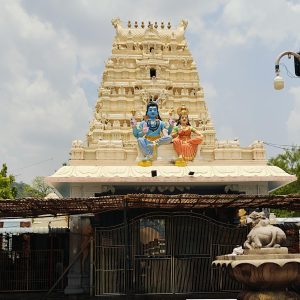About
Sri Mahanandeeswara Temple is a revered pilgrimage site dedicated to Lord Shiva, nestled amidst the serene Nallamala Hills in the Nandyal district of Andhra Pradesh. More than just a temple, it’s a spiritual haven known for its unique natural springs and architectural grandeur, attracting devotees and tourists alike. This ancient shrine, steeped in history and folklore, offers a unique blend of spiritual solace and natural beauty.
The Mystical Pushkarni (Holy Water Pools)
One of the most captivating and unique features of Mahanandi is its system of freshwater pools, known as Kalyani or Pushkarni.
- Three Pools: The main temple is surrounded by three pools: two smaller ones at the entrance and a large, central one inside the temple premises, known as Rudragundam.
- Perennial Flow: The water in these pools is crystal clear and flows continuously throughout the year, regardless of the season. This constant flow is a natural marvel.
- Mysterious Origin: The water source originates directly from the basement of the Garbhagruha, just below the Swayambhu Lingam. The exact source of this perennial spring remains a mystery.
- Constant Water Level: The inlets and outlets of the main tank are ingeniously designed to maintain a constant water depth of five feet, allowing pilgrims to bathe comfortably. However, bathing in the inner large pool is usually prohibited after 5 PM.
- Healing Properties: The water is renowned for its crystalline purity and believed healing qualities. It’s often described as tepid, staying warm in winter and cool in summer.
Timings to visit Sri Mahanandeeswara Temple
04:30 AM – 01:00 PM | 02:00 PM – 9:30 PM
Sevas / Darshan Ticket Prices
| S. No | Name of the Seva | Price (in ₹) | Timings |
|---|---|---|---|
| 1 | Suprabhatha Seva | ₹100 | Early Morning: 4:30 AM to 5:00 AM |
| 2 | Abhishekam & Lingarchana Seva | ₹200 | Morning: 5:00 AM to 5:30 AM |
| 3 | Rudrabhishekam & Lingarchana Seva | ₹200 | Morning: 5:30 AM to 6:30 AM |
4. General Darshan / Paid Darshan Tickets
a) Paid Darshan | ₹50 | Morning: 6:30 AM to 12:30 PM
b) Free Darshan | Free | Morning: 6:30 AM to 5:30 PM
c) Special Darshan | ₹150 | Morning: 6:30 AM to 8:00 PM
Note: For school students in uniforms and those with disability ID cards — Free Darshan is provided.
5. Kalyanam Seva (Daily)
a) With Temple Provided Material | ₹1500 | Morning: 10:00 AM to 12:00 PM
b) With Own Material (Only Ticket) | ₹500 | Morning: 10:00 AM to 12:00 PM
6. Mahanyasa Purvaka Rudrabhishekam | ₹1500 | Morning: 7:30 AM to 11:00 AM (Sundays, Mondays, Full Moon, New Moon)
Ticket Distribution: 7:30 AM to 9:30 AM
7. Mahamrityunjaya Homam | ₹1500 | Noon: 12:30 PM to 2:00 PM
8. Ratha Seva | ₹100 | Evening: 9:00 PM to 9:30 PM
Note to Devotees: Without a proper receipt/ticket, the seva or darshan is not permitted. Please take tickets at the counter only.
Pooja Timings
Mangala Vadhyamulu: 4:45 AM
Swamy Vari Sthanika Abhishekam: 5:30 AM
Mahamangala Harathi: 6:00 AM
Abhishekam Swamy Vari: 6:30 AM – 12:30 PM
Laghunyasa Abhishekam: 6:30 AM – 12:30 PM | 6:00 PM – 8:30 PM
Mahanyasa Purvaka Ekadasa Rudrabhishekam: 6:30 AM – 12:30 PM | 6:00 PM – 8:30 PM
Prasadam
Pulihora: Rs.10/-
Laddu: Rs.10/-
Abhishekam Laddu: Rs.50/-
Festivals Celebrate at Mahanandi
Ugadi: March / April
Vaikunta Ekadasi: December/ January
Kartika Pournima: November/ December
Vijayadashami: October
Mahanandi Hotel Booking
Call Us To Check Availability And Booking +91 – 9110583839
How to reach Mahanandi
By Air: GMR Indira Gandhi International Airport – 215 km.
By Rail: Nandyal – 16 km, Gajupally Railway Station – 6 km,
By Road: Mahanandi – 16 km, Nandyala – 100 km, Kurnool – 80 km
Address
Sri Mahanandeeswara Swamy Vari Devasthanam, Mahanandi, Kurnool District – 518502, Andhra Pradesh.
Also Read Places to Visit In and Around Kurnool District
Also Visit AP Temples Official Website
FAQ
Q1: What is the significance of Mahanandi Temple?
A: Mahanandi Temple is an ancient temple dedicated to Lord Shiva, known here as Sri Mahanandeeswara Swamy. It is one of the nine Nandis (Nava Nandis) and is renowned for its sacred water pools and centuries-old traditions.
Q2: What is the temple famous for?
A: The temple is famous for its crystal-clear water pools, ancient architecture, and continuous water flow from underground springs.
Q3: Can I book sevas online?
A: Currently, seva booking is generally done at the temple counters. Check the official website or inquire locally for online options.
Q4: Are there facilities for physically challenged or senior citizens?
A: Yes. Devotees with disability cards and students in uniforms are allowed free darshan. Wheelchair assistance is usually available.
Q5: Is photography allowed inside the temple?
A: Photography is generally not allowed inside the sanctum sanctorum. It may be permitted in the outer areas.
Q6: Is parking available?
A: Yes, there is ample parking space near the temple for cars and buses.
Q7: What is the history of the temple?
- The Cow and Ant-hill: One prominent legend tells of a cowherd noticing a particular cow emptying its milk daily onto an ant-hill. Upon investigation by the king, a young boy (Lord Shiva in disguise) was seen drinking the milk. When the king tried to approach, the deity vanished, and the cow’s hooves left impressions on the ant-hill, where the Lingam later manifested. This led to the construction of the temple.
- Divine Architect: Another story speaks of a divine architect who sculpted the lingam from a single stone, leaving it suspended mid-air, an act of divine craftsmanship.

Post Discussion